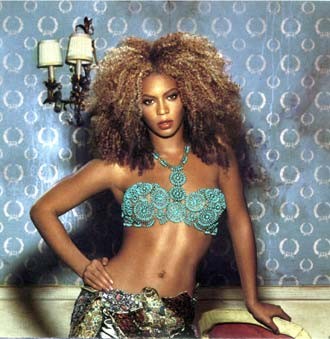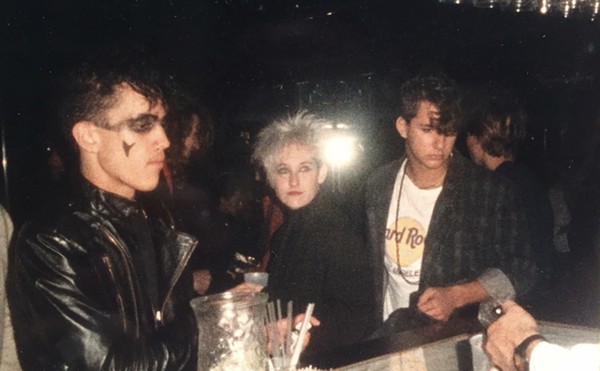| Beyoncé: contemporary pop's reigning diva |
There's a symmetry behind the Verizon Ladies First tour that suggests some real planning. Offering a package of three big-name female pop stars, the show seemingly covers all the contemporary R&B bases.
First off, there's Alicia Keys, the so-called "real musician," a classically trained pianist and painfully serious songwriter who is convinced she's returning the soul - and social consciousness - to soul music. On the other end of the spectrum, you have Beyoncé, the glamorous diva, who is all about megawatt star power and unbridled sexuality.
Serving as a balance between these two chanteuses, Missy Elliott is the offbeat visionary, a producer, writer, and performer who is the connective tissue for almost all modern R&B and commercial hip-hop. In the same way that Whoopie Goldberg has never seen a movie script she didn't like, Missy has never come across a tour, production assignment, vocal cameo, or Madonna Gap commercial she could turn down.
Two years ago, this same bill would have resembled a fair fight. Elliott was riding high on the charts and Keys was the industry's hottest newcomer. Meanwhile, Beyoncé was the lead singer of Destiny's Child, a star only beginning to establish a solo identity.
These days, the contest is an undeniable mismatch. Keys' tepid sophomore release, The Diary of Alicia Keys, has been a respectable but uninspiring chart presence, while Elliott's This Is Not a Test! can only be regarded as a stunning failure (already down to number 77 on Billboard, after only three months). As for Beyoncé, in case you blinked, she's basically conquered the planet.
In some ways, Beyoncé's 2003 solo debut, Dangerously in Love, was a letdown. Her songwriting for Destiny's Child had established a knack for loopy phrasing and a defiant, intuitive feminism. Liberated from the confines of the group, Beyoncé actually retreated from her more eccentric impulses. In place of the sassy challenges of "Say My Name" and "Bootylicious," she offered herself as an all-too-willing sexual fantasy figure on tracks like "Naughty Girl," "Baby Boy," and "Hip Hop Star." She also saw fit to devote two songs - "Signs" and "Gift From Virgo" - to her astrological fixations, which can only be viewed as two songs too many.
But that's part of the messy equation with Beyoncé. Relentlessly ambitious, she wants it all. She's simultaneously obsessed with intangible and tangible success: expanding her artistic horizons as well as moving tons of product. One minute, she'll gush about the purity of her love for oil painting (which she does while listening to Miles Davis and Björk), and the next minute, her careerism kicks in and she talks about wanting to add an Oscar and a Tony to her collection of Grammy awards.
Unlike Keys, however, Beyoncé is fascinating because she seems capable of real growth. Seeing her bring down the house with Prince at last month's Grammys, or set "Proud Mary" ablaze at last year's VH1 Divas show (with an out-of-her-league Jewel), she comes off as a force of nature, like a young Tina Turner with uptown style.
| Beyoncé with Alicia Keys, Missy Elliott 7pm Wednesday, March 17 $48.50-68.50 SBC Center 1 SBC Center 444-5000 Current Choice | ζ |
While both Spears and Aguilera were products of working-class families, Beyoncé grew up in a sprawling house in an affluent Houston neighborhood, the daughter of a Xerox sales executive and a beauty salon owner. Like Spears and Aguilera, Beyoncé learned the show-biz ropes as a child performer on the talent show circuit, groomed for success by an eager stage parent (in this case, her dad). You still see the effects of this informal charm school training in the studied carefulness Beyoncé exhibits in interview situations, the way she always strikes the perfect note of public graciousness.
Although all three singers grew up at the same time, and heard much of the same music on the radio, Beyoncé was also raised in the church, and picked up on the roof-raising intensity of Southern gospel music. U2's Bono, one of her biggest fans, recently put it this way to In Style magazine: "Underneath the glamour-puss routines and soulful sexiness, there's a gospel heart beating."
Spears obviously studied too much Madonna and not enough Aretha, and Aguilera learned her every excess from Mariah Carey, but Beyoncé absorbed the influence of all the soul greats her father idolized.
At her best, as on the wildly propulsive hit "Crazy In Love" or the no-nonsense breakup tale "Me, Myself and I," she comes off as more than pop's latest flavor. She hints at the possibility that she could be R&B's next great icon. •

















